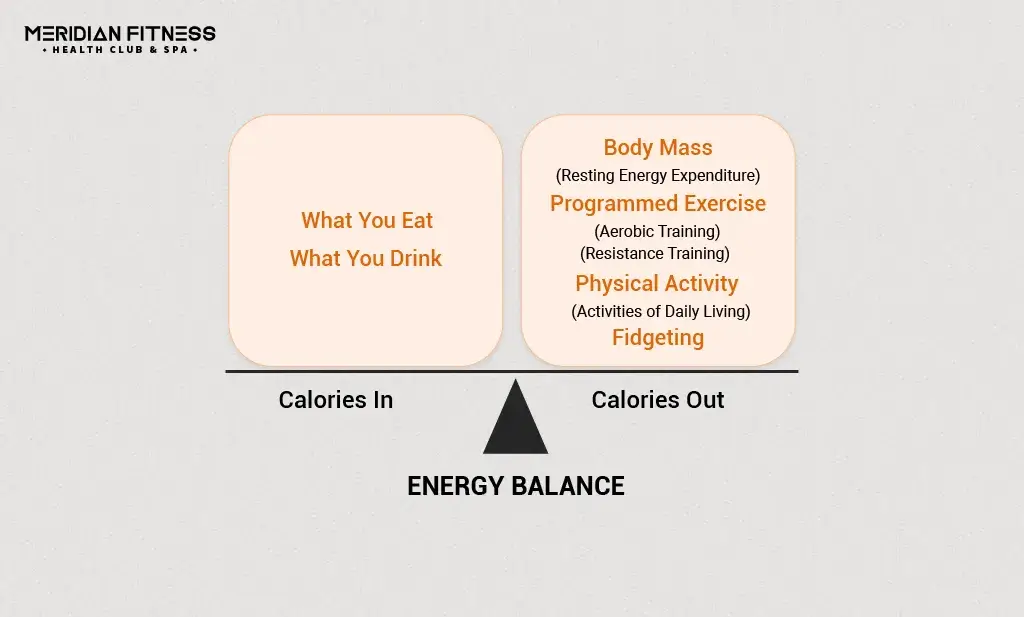Did you know that nearly 40% of adults in the world are overweight or obese? These alarming statistics highlight the world’s global crisis that needs urgent attention and creates urgency to understand that “a healthy diet is crucial for getting and maintaining a healthy body weight and fitness level.” So let’s understand this!
Understanding Body Weight And Fitness
What exactly do “Body Weight” and “Fitness” mean in this context? Your body’s total mass, which consists of bone, muscle, fat, and water, is your body weight. On the other hand, fitness measures your body’s capacity to engage in physical activity with the best possible strength, stamina, and flexibility. Because of this, it’s essential to maintain a healthy body weight and level of fitness to improve general well-being and lower the chance of developing chronic illnesses.
Misconceptions Of People Related To Body Weight And Fitness
To get fit, here are some misconceptions of people related to fitness and body weight that need to be addressed first. We often witness people saying that “ they want to lose weight to get fit” because they are unhappy with the number on the scale. But in reality, they struggle to lose fat, not body weight.
Our body mainly comprises water, protein, minerals, and fat. Hence, we weigh the total body mass when we measure body weight. But body fat is not the same as body weight. Remember, “losing body weight never means you lose fat, but losing fat does significantly reduce weight.”
Another common misconception is that body weight and fitness level are the same. However, body weight is only one indicator of fitness, while overall physical health and well-being are more important.
The Acceptable Percentage Of Fat In The Human Body
| Women (%) | Men(%) | |
| Essential Fat | 10-12 | 2-4 |
| Athletes | 14-20 | 5-13 |
| Fit | 21-24 | 14-17 |
| Acceptable | 25-31 | 18-25 |
| Obese | 32+ | 25+ |
To be more precise and practical, body fat percentage is a better indicator of a person’s health than body weight. Regular exercise and adherence to a nutritious diet are crucial to keep body fat percentages within a healthy range. By simply understanding your body weight and fat percentage, you can determine and focus on your health & fitness goals.
Maintaining Body Weight Vs. Maintaining Fitness level
Some people often use body weight as a measure of their fitness level, which is not quite right because body weight is just a single indicator of fitness. As we have already described, “Staying fit means carrying out your daily tasks actively, with energy, and without feeling fatigued. Fitness is the collection of healthy attributes like body composition, muscular endurance, physical strength, cardiac health, and flexibility.”
For general fitness and well-being, it is essential to maintain a healthy body weight and level of fitness through a balanced diet and frequent exercise. Excess body weight can strain the cardiovascular system, joints, and muscles, making engaging in physical activity and maintaining fitness harder. Conversely, being underweight can negatively impact fitness by reducing muscle mass and strength. Therefore, focusing on both body weight and fitness levels is important to achieve optimal health.
Remember that Regular exercise and a healthy diet are key to achieving and maintaining a healthy weight and fitness level.
The Role Of Diet In Body Weight And Fitness Management
Regular breakfast consumption has been associated with numerous health benefits, including a reduced risk of obesity, diabetes, and heart disease. This is because eating a healthy morning meal helps replenish blood sugar levels, which are essential for optimal muscle and brain function throughout the day.
That eloquently highlights the significance of diet and how it impacts our daily activities. We all have Googled and tried to go for a more balanced diet to achieve our fitness goals. Below are some of the ways

The Concept Of Energy Balance In Calories
The relationship between the number of calories you burn from physical activity and all other everyday body functions and the number of calories you take in from food and drink is known as energy balance. You need to ingest the same amount of calories as you burn off to stay at a stable weight. You will gain weight if your calorie intake exceeds your energy expenditure. On the other hand, weight loss occurs when you burn more calories than you take in.
Role Of Macronutrients (Carbohydrates, Proteins, Fats)
The role of macronutrients (Carbohydrates, Proteins, Fats) cannot be ignored, and a balanced diet encompasses all of them in one meal. The percentage of each macronutrient in a meal varies according to the health and fitness goals.
Carbohydrates (45%-65%)
They are the primary source of the body’s energy. On the other hand, a diet high in refined carbohydrates—like white bread and sugary drinks—can cause weight gain. It’s critical to prioritise complex carbs like those found in fruits, vegetables, and whole grains.
Proteins(10-35%)
The building blocks of human tissues, proteins aid tissue growth, repair, and healing. The most preferred choices of lean protein intake are chicken, fish, beans, and tofu, which support weight management and fitness goals.
Fats (25%-35%)
That supports various body functions, but because it is calorie-dense, we keep cutting back on it or prefer to choose healthy substitutes. Choosing healthy fats, such as those in avocados, nuts, and olive oil, can promote satiety and help with weight loss.
How Micronutrients Support Overall Health And Well-Being

Micronutrients, such as multiple vitamins and minerals, are the next main factor in a balanced diet. They help and support human functionalities, balance hormones, metabolism, immune function, and bone health. Whether you want to lose weight or get fit, these micronutrients will help you achieve your goal. As they don’t contribute to weight gain, they help the body improve overall health and well-being.
Diet Can Affect Athletic Performance And Exercise Recovery.
As we have already said, diet plays an important role in our daily life routine, fitness, and weight management. In the same way, it helps athletes keep up with their high-performance activities and boosts their exercise recovery. An appropriate, nutrient-dense diet gives you the energy and nutrition you need to work out at your best. Lastly, it also aids in repairing and rebuilding muscle tissues afterwards.
Importance Of Pre- And Post-Workout Nutrition
If you are a fitness lover who is always on the track on and off, you must know that taking high-energy snacks is always suggested before the workout. Taking the right nutrients can significantly boost your workout productivity and efficiency.
Carbohydrates
Carbohydrates are known for their high-calorie count, which makes them readily available to energise you and fulfil your body’s needs quickly. You may take whole-grain bread, fruits, and yoghurt. Moreover, taking carbohydrates after the workout will replenish your energy and lower your fatigue.
Protein
Secondly, protein is also a good choice as a pre-workout snack, as it helps prevent muscle breakdown and supports muscle repair. Protein shakes, almonds, and eggs all provide protein. In addition, protein provides 9 essential amino acids that repair muscles and reduce inflammation and soreness.
Tips for Maintaining a Healthy Diet
Initially, taking bigger steps often takes you back to where you have just started. Hence, personal trainers and nutritionists recommend starting gradually. Don’t overhaul your whole diet; take small, sustainable steps and change your diet. You can begin mindful eating and maintain a nutritious, well-balanced diet by following these steps, which are:
Switch To Whole Foods Than Processed Food
Choose unprocessed, entire foods such as vegetables, fruits, whole grains, lean meats, and healthy fats. These foods offer long-lasting energy and are high in nutrients.
Plan Ahead And Read Labels Before Buying
It is a wise strategy to plan your meals and cook at home. Also, pay attention to the serving quantity, calorie count, sugar, and ingredients before buying anything.
Practice Portion Control
You cannot always measure calories. Hence, it is recommended to be mindful of portion size. You may also use a cup size or a food scale to help you control the portion of your meal, even for healthy meals.
Stay Hydrated And Limit Sugar
Always drink plenty of work to never dehydrate your organs because half of your bodily function depends on your water intake. Water promotes overall health, nutrient absorption, and digestion. Also, let us clarify that sugary drinks are not healthy and are exempted from water intake.
Be Mindful Do Not Over Snack
This is a very important tip to follow: Pay attention to your hunger and fullness cues. Eat slowly and savour each bite. Avoid activities that could cause you to overeat while you’re eating, such as watching TV or browsing through your phone. Moreover, pay attention to your body and just consume food when it’s time to eat. Mindless eating might result in unhealthy eating habits. When you’re hungry, eat; when you’re satisfied, stop.
Get Professional Help
Last but not least, allow yourself occasional treats in moderation because deprivation can lead to cravings and overeating. Lastly, food choices should be made for a lifetime, not just as a temporary fix.
Conclusion
The importance of diet and its role in optimal body weight and fitness management cannot be ignored, but it’s all about finding the right balance! Balancing your intake diet with how much you burn with exercise or daily life activities. To maintain a steady weight, keep the scale balanced. You will put on weight if your calorie intake exceeds your burning. You’ll drop pounds if you burn more calories than you take in.
Then comes the importance of a balanced diet because it is not just about the calories; the foods you choose matter, too! Carbohydrates, proteins, and fats (macros) are the main players. Also, don’t forget about the vitamins and minerals (micros) that keep everything running smoothly!
Finally, it’s about making educated decisions and finding a sustainable, balanced eating pattern that suits you rather than following rigid diets or fast cures. By combining that with frequent exercise, you can get a healthier and happier version of yourself!






